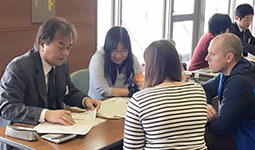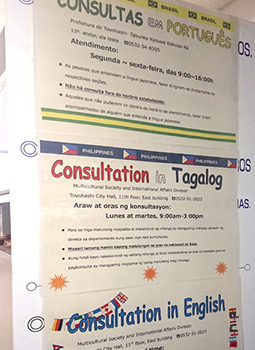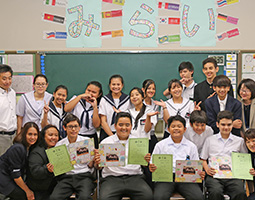Home > Highlighting JAPAN > Highlighting Japan June 2019 > Toward a Multicultural Symbiotic Society
Highlighting JAPAN
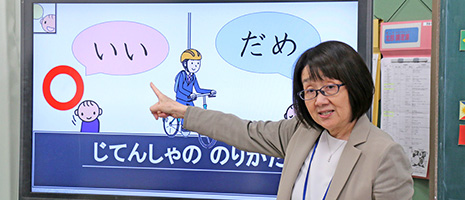
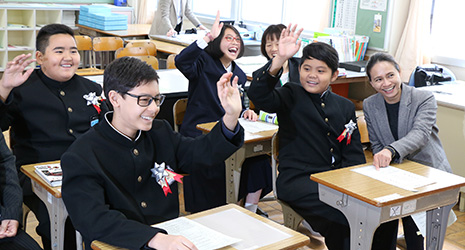
Living Together as Active Members of the Local Community
Toyohashi City in Aichi Prefecture aims to build a community where everyone can live comfortably by creating a symbiotic society where people of different nationalities live together as members of the local community. Recent years have also seen increased opportunities for foreign residents to play an active role in the local community.
Revision of the Immigration Control Act in 1990 giving second and third generation persons of Japanese descent (nikkei) the right to permanent residence resulted in an influx of South American nikkei to areas with high concentrations of automotive-related industries such as Gunma Prefecture, Shizuoka Prefecture and Aichi Prefecture. This led to the emergence in the late 1990s of districts with concentrated populations of foreign residents amounting to half the resident population, coinciding with a variety of challenges for local governments. In response, local governments accepted non-Japanese nationals into their communities while at the same time engaging in ongoing proactive initiatives to create a symbiotic society. Toyohashi City in Aichi Prefecture is one such local government.
In 2006, Toyohashi City officially declared itself a “city of peace, exchange and symbiosis” in response to the “Multicultural Symbiotic Community Promotion Plan” formulated by the Ministry of Internal Affairs and Communications the same year. The “Toyohashi City Plan for the Promotion of Multicultural Symbiosis” was positioned as a concrete action plan to achieve this in 2009.
According to Takashi Miwata, supervisor of Toyohashi City’s Multicultural Society and International Affairs Division, “This year’s plan is the third since the first Multicultural Symbiosis Community Promotion Plan was formulated in 2009, for implementation through fiscal 2013. Since that time, the number of projects has increased from fifty to sixty-five due to the diversification of support needs in recent years, such as internationalization and changes to the allocation of residence status.”
The population of Toyohashi City as of April 1, 2019 is 376,181, including 17,601 foreigners. Japanese Brazilians began migrating to Toyohashi City in 1990, and by 2008 they numbered upward of 13,000. However, this number decreased for a while around the time of the Lehman shock, when many returned to their country. Meanwhile, Filipinos began entering the country in significant numbers from 2008, and in 2015 Japanese Brazilians who had returned to their country began migrating back to Toyohashi City. Currently, the number of migrants is on the rise, predominantly from these two countries. The largest group is from Brazil, at 7,911, followed by 3,685 from the Philippines. According to Toyohashi City, the migrant group with the highest growth rate since 2015 is from Vietnam, and it is expected that the future will see an increase in migrants from Indonesia and other parts of Southeast Asia.
In light of this situation, Toyohashi City is promoting the creation of multilingual services, establishing a consultation counter for foreigners in the city hall that handles enquiries not only in English and Portuguese as has been the case up to now, but also in Tagalog. Through this consultation counter, foreign residents are referred to the relevant section, each with its own consultation counter staffed by a total of six interpreters in three languages.
In the field of education, 2018 saw the opening of Mirai, a school within Toyooka Junior High School providing early support for junior high school students recently arrived in Japan and foreign students transferring from schools for foreign nationals to junior high schools in the city. Portuguese and Tagalog consultants are assigned to the support school, where students have two months’ intensive instruction in Japanese reading, writing and conversation, as well as studying English and mathematics. While attending Mirai, students attend the junior high school of the school district in which they reside one day a week, facilitating their transition to the school later.
Toyohashi City conducted questionnaires of residents and held meetings for foreign citizens to gather opinions with regard to the review of existing multicultural symbiosis projects and the launch of new projects. Reflecting this feedback, the third Plan for the Promotion of Multicultural Symbiosis includes the new issue of the aging of foreign citizens. At present, the average age of foreign citizens is early 30s. Looking to the future, however, Toyohashi City is making preparations to provide support that responds to every stage of life, from early childhood to old age.
Further, the City is strengthening collaboration with NPOs and other private support groups for foreign residents. Activities by private bodies have led to local residents becoming gradually more accepting of foreign residents, and recently opportunities for foreign residents to take an active part in the local community are increasing.
“There have even been cases of foreigners serving as neighborhood association officers. And foreign instructors have been trained in the Red Cross First Aid Method, the first in Japan. It is pleasing to be able to create an environment where non-Japanese nationals are providing the support as residents of Toyohashi City,” says Miwata.
By fusing the values, culture and individuality of foreign residents with existing Japanese values, Toyohashi City is promoting the development of a more vibrant society.
© 2009 Cabinet Office, Government of Japan
